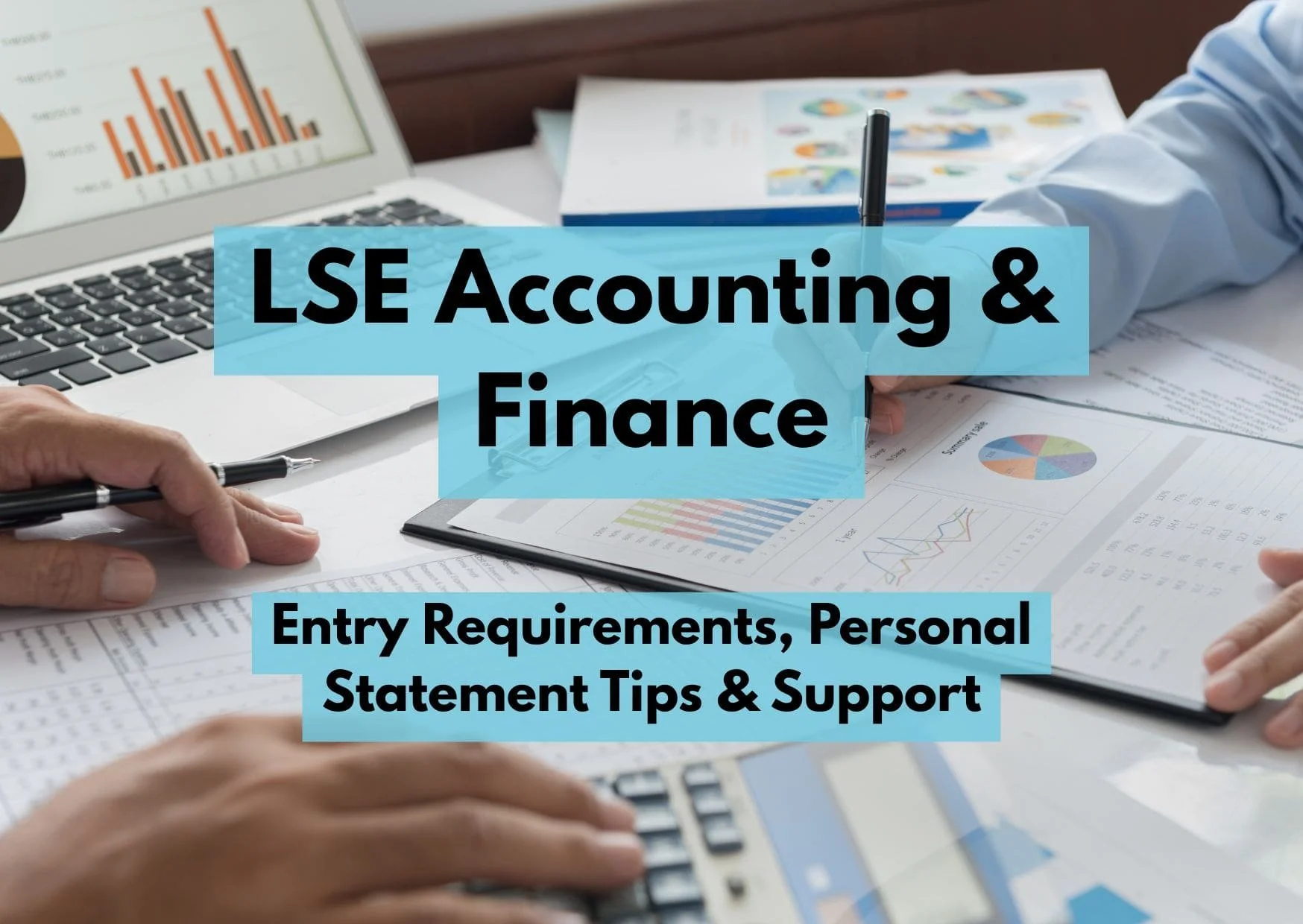LSE Accounting and Finance: Entry Requirements, Personal Statement Tips & Support
Blog Contents:
Why Study Accounting and Finance at LSE?
The London School of Economics and Political Science (LSE) is a UK and global leader in Accounting and Finance higher education provision:
QS World Rankings for Accounting and Finance rank LSE 8th globally.
Complete University Guide ranks 1st in the UK for Accounting and Finance. The Guardian also places it at the top in the UK for 2026.
Alongside being the best UK university for accounting and Finance, the course is also accredited by the following bodies:
Association of Chartered Certified Accountants
Chartered Institute of Management Accountants
Chartered Institute of Public Finance and Accountancy
Institute of Chartered Accountants in England
Accreditation means students are exempt from specific professional examinations.
It sets students up for a successful career in Finance:
Employers regard the course incredibly highly, given the skills it provides students.
LSE is at the forefront of financial education, research, and how the sector intersects with the world.
The course has an international perspective, exploring Finance from a global perspective rather than a UK-focused one. This makes the degree globally applicable and valuable.
Many students become professional accountants, investment bankers, consultants, academics, and more.
Some modules on offer ensure students are exempt from specific accountancy exams by the time they graduate.
LSE Accounting and Finance Course Overview
The course focuses on both technical accounting and broader financial and economic concepts.
You develop a mix of practical skills employers value and knowledge about the workings of finance and accounting more broadly.
Students are exposed to the practical workings of financial organisations, how accounting and finance interlink to broader society, and why they matter.
Accounting and Finance are explored through politics, sustainability, history, and other social sciences to learn more about their global relevance.
Each year, students take a mix of compulsory and optional modules:
One of the most exciting compulsory modules LSE offers to all first-year undergrads is LSE100. This is an interdisciplinary course for all first-year undergrads. Students can choose one focus from a range of questions, including ‘How can we control AI?’ and ‘How can we transform our climate futures?’.
This is one of the ways LSE keeps students forward-facing and equips them with key skills needed in the modern workplace, such as resilience and adaptability.
Course options cover accounting, statistics, finance, micro and macro economics, maths, and more.
Students are also encouraged to take modules from other courses, where possible, to ensure they are well-rounded.
Students can expect around 12-15 contact hours a week. This tends to be a mix of lectures and classes.
Independent study alongside this is expected.
LSE Entry Requirements for Accounting and Finance
What A-Levels do you need?
The only compulsory A-Level is Mathematics.
Aside from that, a broad mix of subjects is recommended, especially traditional subjects with strong written and analytical abilities.
A previous study of accounting is not required.
Can I get into LSE with AAB?
No, unless it’s a contextualised offer.
Even then, an A in Maths is required.
Typical offers:
A-Level – AAA.
IB – 38 overall. 766 in higher-level subjects. Maths at a higher level is required.
Do I need to take an admissions test?
No!
Students’ applications are considered based on their academics, A-Level or equivalent subjects, personal statement, teachers’ reference, and educational circumstances.
There also aren’t any interviews.
Are international students accepted?
Yes!
Overseas students are warmly welcomed and should also apply via UCAS.
You can find details about grade requirements for your country’s qualifications here.
Overseas students are charged £35,700 per year.
How Competitive Is LSE Accounting and Finance?
Given that employers value the course and LSE is a globally renowned university, it’s no surprise that it is incredibly competitive.
There is an extremely high demand for a limited number of places.
In 2024, there were 2283 applicants for 140 places. This translates to 16 applicants for every place.
Acceptance, especially for international applicants, is very selective, so why not use a tutor to boost your chances of LSE admissions success? Learn more about U2 Tuition’s university mentoring here.
Crafting a Standout Personal Statement for LSE:
Given the fierce competition for places and the limited components of an LSE application, it’s crucial to get your personal statement right!
The UCAS personal statement asks students to respond to three questions in a maximum of 4,000 characters.
Why do you want to study this course or subject?
How have your qualifications and studies helped you to prepare for this course or subject?
What else have you done to prepare outside of education, and why are these experiences useful?
Learn more about our tips for understanding the new personal statement format here.
General Tips
LSE values intellectually curious students with quantitative ability, so try incorporating these into your personal statement.
It’s essential to demonstrate an interest in both accounting theory and finance.
They appreciate that you won’t have studied accounting at school, but they seek evidence of engagement with Economics, Maths, financial concepts, and more.
Having clear career motivation can help explain why you want to study the course.
Engage with extra-curricular opportunities at school:
This can include sports, music, drama, and more!
These enable you to develop transferable skills that can benefit a career in finance, such as leadership, resilience, and time management.
It’s also essential to show holistic development and interests.
Common mistakes to avoid:
Don’t just list your achievements.
Don’t write about things you haven’t actually done.
Independent Subject Exploration Tips
For question three, evidence of independent subject exploration is vital. This could take several forms:
Engage with economic news, journals, and research.
Explore articles in The Economist, Financial Times, and Harvard Business Review.
Research a real-world financial event, such as the 2008 world crisis.
Explore some of the suggested preliminary reading on the LSE course page.
It acknowledges that some of this is academic, but it helps discover key issues.
It can be a good place to learn more about what concepts you find interesting and would like to research further.
Our co-curricular division, Minds Underground, offers multiple enrichment opportunities that provide evidence of independent extra-curricular exploration.
Along with personal statement content and the opportunity to learn more about finance and accounting, they offer students the chance to develop research, critical thinking, and analysis skills.
Under the guidance of specialists in the field, students produce projects varying from research papers to prototypes and presentations.
They receive guidance on key academic theories surrounding the topic, how to shape their independent research, and the drafting and refining of the project.
Finalised projects can be published on our website!
Our projects are entirely customisable. You can use one of our existing project outlines or develop your title.
Within Finance and Accounting, previous projects have included Finance & Economic Growth, Game Theory & Business Strategy, Mergers & Acquisitions, and Behavioural Economics.
Our summer schools are run by Oxbridge-educated tutors who lead students in interactive seminar-style sessions.
Our Economics programme introduces students to key financial concepts and university-level thinking and provides content and advice for university applications.
Applied Economics, Microeconomics, Game Theory, and more.
Students write 1000-1,500-word essays in response to a question.
Each year, we provide three essay questions. Previous questions have included:
Is a universal basic income (UBI) a viable solution to inequality in the 21st century?
Should economic growth be prioritised over environmental sustainability?
How do behavioural economics challenge traditional economic theories?
What is the greatest economic challenge the world currently faces? – Explain why and how to solve it
These are 1-1 sessions with subject experts to help you develop an understanding of key Economic concepts and areas of debate.
For instance, ‘Will Disruptive Technologies Have the Effect Predicted?’, or ‘Modelling Technological Innovation and Change’.
Looking for more support?
U2 Tuition’s university mentors can provide tailored personal statement support.
We can provide expert LSE Accounting and Finance tutors who know the course and what the admissions team look for in prospective students:
They can offer bespoke advice based on your interests, strengths, areas of development, and their familiarity with LSE-style personal statement structure.
They offer drafting and refining support, tailored reading and extra-curricular recommendations.
Having received their own offers to study Accounting and Finance at LSE, they know what makes a successful applicant and relish supporting others.
How U2 Tuition Supports LSE Accounting and Finance Applicants
U2 Tuition provides you with the best chance at crafting a standout application. Our offerings include, but aren’t limited to:
Specialist tutors who are LSE graduates and Oxbridge mentors with lots of experience supporting students with LSE, finance, and accounting applications.
Step-by-step personal statement preparation guidance, including extra-curricular activities, drafting, and refining.
International applicant guidance, including breaking down the process for you and supporting you every step of the way.
We offer bespoke tutoring, tailored to your interests and adapted to your strengths and areas of development. Following an initial diagnostic session, we curate a targeted tuition plan to help you produce the strongest application.
In-depth feedback including reports after every session, structured prep plans, and between-lesson feedback.
Flexible sessions tailored to the support you require, whether the end-to-end process, just the personal statement, or something else!
General subject tuition to ensure you secure high predicted grades and meet your offer.
Learn more about our LSE application support through a free 20-minute consultation.





